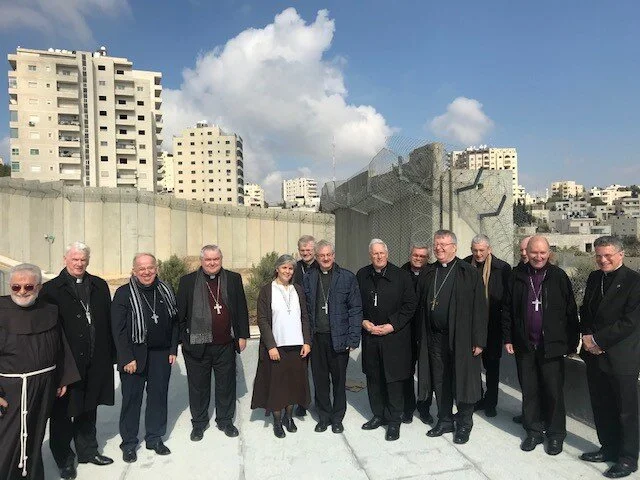Prayer, Pilgrimage, Presence and Persuasion: Bishop Christopher Chessun reflects on a virtual Holy Land Coordination
January 2021
Since 2000, in January each year, the Catholic Bishops’ Conference of England and Wales has taken part in what is known as the Holy Land Coordination. Bishops from around the world visit the Holy Land as an act of solidarity with the region’s Christian communities, and to share in the pastoral life of the local Church. Unsurprisingly, this year the visit was unable to take place in the usual fashion. Instead, the Holy Land Coordination took place virtually. Here, Christopher Chessun, Anglican Bishop of Southwark, Embrace patron and participant in the Coordination for a number of years, tells us about the experience.
Each new year, back to 2015, I have participated in the Holy Land Coordination (HLC) at the invitation of the Catholic Bishops’ Conferences from which all the other episcopal delegates have come, this year from three continents. Mandated by the Vatican, HLC has a simple remit: to focus on Prayer, Pilgrimage, Presence, and Persuasion. It is a relational encounter with friendships and associations deepening year by year, and on returning to our homelands part of the ‘persuasion’ is about publicising the agreed Communiqué and discussing the contents with civic, diplomatic, parliamentary and governmental authorities.
Every year we hear the people of the Holy Land and are ‘inspired by their resilience and faith in a worsening situation’ Following last year’s Coordination, the subsequent threatened annexation of the Occupied Territories led to concerted action by Church Leaders, supported by Embrace, in speaking out against the injustice of this path.
This year was the first time we met virtually, with four key 90 minute sessions on the current situation in the Holy Land, the situation in Gaza, a dialogue with young people of Israel and Palestine and a private meeting with the Latin Patriarch of Jerusalem and the Apostolic Nuncio. Notwithstanding the limitations of meeting online there was a degree of intimacy as we listened to ‘our sisters and brothers in the homeland of Christ.’ Their stories were profoundly moving.
Holy Land Coordination 2019: The roof of the Comboni Sisters House at Bethany - Al Wafa’ Street- East Jerusalem, with Separation Barrier in evidence.
Ongoing injustice, marginalisation and economic challenges have been an abiding theme of our meetings; but with all these compounded by the impact of the pandemic ‘it has become painfully clear that there is today less cause for optimism than at any time in recent history.’ Martin Luther King said in his famous ‘I have a dream’ speech, ‘with this faith we will be able to hew out of the mountain of despair a stone of hope.’ In Israel and Palestine where poor political leadership is evident in both states that stone is certainly the living stone of the people.
It follows, then, that we should heed the witness of the young people of the Holy Land, and pray and work for the sort of political and economic renewal they seek; for they have a clarity of vision for the future that is both positive, generous in spirit and pressing. The institutions of the Christian presence both in the Holy Land and throughout the Middle East, which is the crucible of Christianity, are the holy sites, the schools, hospitals, and clinics which make a disproportionately significant contribution to the wellbeing and social cohesion of the whole community.
In the Holy Land these institutions need immediate help in the wake of the pandemic, not just because this has brought added pressures, but because the absence of visitors and pilgrims has cut off a vital source of funds. It would be a tragedy if any are forced to close and the consequences would reach far beyond their immediate beneficiaries. In the midst of so much that presses upon us here at home, we should still remember (not least in what is still the season of Epiphany), the need to support those who live and labour in the Holy Land. Embrace the Middle East supports a number of local partners who do just that.
Learn more about our partners in the Middle East.


